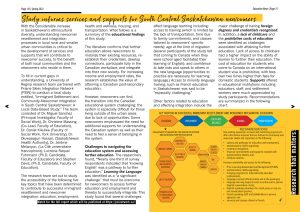 With the considerable increase in Saskatchewan’s ethnocultural diversity, understanding newcomer resettlement and integration processes in local rural and smaller urban communities is critical to the development of services and supports that will contribute to newcomer success, to the benefit of both local communities and the newcomers who reside in them.
With the considerable increase in Saskatchewan’s ethnocultural diversity, understanding newcomer resettlement and integration processes in local rural and smaller urban communities is critical to the development of services and supports that will contribute to newcomer success, to the benefit of both local communities and the newcomers who reside in them.
To fill in current gaps in understanding, a University of Regina research team partnered with Prairie Skies Integration Network (PSIN) to conduct a local study entitled, “Immigrant Settlement and Community-Newcomer Integration in South Central Saskatchewan: A Local Data-Based Study.” The team consisted of Dr. Miguel Sanchez (Principal Investigator, Faculty of Social Work), Dr. Christine Massing (Co-Lead, Faculty of Education), Dr. Daniel Kikulwe (Faculty of Social Work, York University), Dr. Oluwasegun Hassan, (Saskatchewan Health Authority), Dr. Jérôme Melançon, (La Cité universitaire francophone), Lucrécia Raquel Fuhrmann (Ph.D. Candidate,
Faculty of Education) and Stephen Davis, (Ph.D. Candidate, Faculty of Education).
The research team set out to study the accessibility of the following five key topics that have been determined to contribute to successful immigrant resettlement and newcomer integration: education, employment, health and wellness, housing, and transportation. What follows is a summary of the educational findings of this study.
The literature confirms that further education allows newcomers to mobilize their existing resources, re-establish their credentials, develop connections, participate fully in the Canadian workplace, and integrate into their new society. For increasing income and employment rates, the research establishes the value of attaining a Canadian post-secondary education.
However, newcomers can find the transition into the Canadian educational system challenging; the system is especially difficult for those living outside of the urban areas due to lack of opportunities. Some newcomers emphasized the need for additional supports for understanding the Canadian system as well as their need to feel a sense of belonging in the system.
Challenges to navigating the education system and accessing further education. The researchers found, “Nearly one-third of survey respondents indicated that ‘knowing English’ was a pathway to further education.” Learning the Language was identified as a “a significant challenge” that must be overcome for newcomers to access further education and employment and thereby to successfully integrate. This study found that several challenges affect language learning including: access to training (which is limited by the lack of transportation, time due to family commitments, and classes tailored to newcomers’ specific needs); age at the time of migration (several participants of the study felt that coming to Canada when they were school aged facilitated their learning of English); and confidence to take risks and speak to others in the new language (opportunities to practice are necessary for learning language.) Access to minority language training, such as French education in Saskatchewan was said to be “especially challenging.”
Other factors related to education and affecting integration include the major challenge of having foreign degrees and credentials recognized. In addition, a lack of childcare and the prohibitive costs of education were identified as challenges associated with attaining further education. Lack of access to childcare had a higher impact on the ability of women to further their education. The cost of education for students who come to Canada on an international student visa is prohibitive, with fees over two times higher than fees for domestic students. Supports offered in educational institutions including educators, staff, and settlement workers were much appreciated by study participants. Recommendations are summarized in the following chart:
Watch for the full report which will be published at https://psinetwork.ca/
Follow us on social media